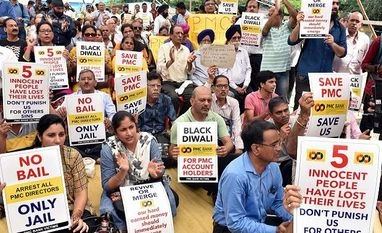It is a month now that the Reserve Bank of India (RBI) has suspended the fraud-ridden normal functioning of the Punjab and Maharashtra Cooperative (PMC) Bank. The RBI has appointed an administrator who, with all due respect to his other skills, has not run a bank, far less a bank that has been hit by a massive fraud. His job, assisted by three others bankers, is not to find a solution, but follow procedure. If the past is any guide, this will turn PMC Bank into a zombie bank, neither living, nor dead.
I gather that some Rs 27 crore a month is needed, just to keep PMC Bank’s 137 branches open across six states while the administrator and his advisors move slowly through the thicket of rules and procedures. The cost of its zombie-like existence, nearly Rs 1 crore a day, will steadily eat up depositors’ money. The longer the bank remains in this state, the more money it loses, because the core banking business of lending money has been halted.
This is what happens every time a cooperative bank is put “under directions” from the RBI. Kapol Cooperative Bank became a zombie bank on March 31, 2017, with a withdrawal cap set at Rs 3,000 per depositor. The bank will remain “under directions” till January 2020. Rupee Cooperative Bank became a zombie bank on February 22, 2013. The depositors don’t have access to their money but the staff gets its salary. The RBI has allowed the bank to release some money for exceptional cases.
The 103-year-old CKP Cooperative Bank was put under directions on May 2, 2012. The RBI-appointed board of administrators ran the bank until April 2015, after which a new board was elected. The depositors converted a part of their money into share capital in 2015. The bank is still “under directions” after several extensions over the years. Every few months more zombie banks join the list: The Needs of Life Cooperative Bank, Kolhapur-based Youth Development Cooperative Bank, Shivam Sahakari Bank of Ichalkaranji, The City Cooperative Bank, Mumbai, Maratha Sahakari Bank, Karad Janata Sahakari Bank all “under directions” of the RBI.
Why is the government responsible?
This process harms depositors, the stakeholders who matter the most. They are victims of fraud, committed by politicians in most cases; in PMC Bank’s case it was a business house. But who is responsible for allowing rampant crony capitalism, fraud and political influence to destroy the savings of millions of depositors in one cooperative bank after another? It is the government (Ministry of Finance or MoF, and the RBI). Consider this:
• The government has overtly encouraged the growth of cooperative banks. At no time has it made customers aware of any additional risk in such banks, over scheduled commercial banks.
• On an average one cooperative bank fails every few months. The RBI has not learnt any lessons from previous failures and has not taken any steps to prevent cooperative bank failures.
• The RBI never made customers aware that it was not regulating them in the same manner as other commercial banks.
• Cooperative banks were allowed to provide many of the services that commercial banks provide. PMC Bank, for instance, was permitted to open non-resident accounts and have foreign currency dealings. It could give bank guarantees, enter into forward contracts, and issue credit cards. All these permissions came from the RBI, presumably after adequate due diligence.
• In permitting specific cooperative banks to issue credit cards or sell mutual funds and insurance, the RBI signalled that they are fit and proper.
• By allowing bank interest to be paid without tax-deducted at source, the MoF encouraged depositors with lower income (below the minimum taxable total income) to invest in fixed deposits of such banks. They were naturally keen to avoid the trouble of filing tax returns and then claiming refunds.
• The revolving door between the RBI’s urban banks department and advisory positions at cooperative banks is scandalous. Senior RBI officials who are sitting on critical information about shady cooperative banks become advisors to the same banks after retirement. Why, senior RBI officials are even gracing the boards of large crooked finance companies.
• For the past 25 years, every single payout of deposit insurance has been to cooperative banks while the bulk of the premium is from scheduled commercial banks. Both the MoF and the RBI have known how cooperative banks work and yet have done nothing about it.
These are only a few of important issues; lack of space prevents me from going into more. I am also quite struck by how callous the RBI has been in handling a failed bank. If a bank has intangible assets, it can be a takeover target. If so, it needs to be treated as a going concern with strategies that are appropriate for it. Instead of a retired central banker, it should be led by someone with deal-making skills that lead to takeover of assets or mergers. If it doesn’t have such assets, it is a gone concern. Such banks need a hardcore banker who can call back the loans, salvage what he can, liquidate investments, pay back the depositors and shut down the bank. In either case, speed and direction is the key. But both MoF and the RBI remain apathetic. They would rather convert all failed cooperative banks into zombie banks. This is another reason why they should take full responsibility for their inaction and compensate the depositors.
The writer is the editor of www.moneylife.in; Twitter: @Moneylifers
Unlock 30+ premium stories daily hand-picked by our editors, across devices on browser and app.
Pick your 5 favourite companies, get a daily email with all news updates on them.
Full access to our intuitive epaper - clip, save, share articles from any device; newspaper archives from 2006.
Preferential invites to Business Standard events.
Curated newsletters on markets, personal finance, policy & politics, start-ups, technology, and more.
)